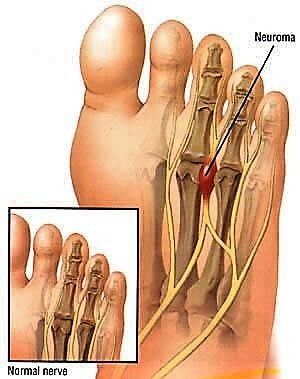Mortons Neuroma
What is Morton’s Neuroma?
Morton’s neuroma refers to a nerve injury between the toes, usually the third and fourth toes, which causes pain and thickening of the nerve tissue.
Morton's neuroma is more common in women than in men. The associated symptoms include:
- Burning pain in the ball of the foot (may also radiate to the toes)
- Numbness in the affected toes
- Inability to walk
What are the Causes of Morton’s Neuroma?
Compression or chronic irritation of this interdigital nerve is the main cause of Morton’s Neuroma.
- Shoes: High heels can put pressure on your toes or the balls of your feet. Shoes that are tight or don’t fit right also can do it. Women are more likely than men to get Morton’s Neuroma due to narrowing of the gap between the toe bones causing thickening of the nerve tissue from scar tissue formation. This causes swelling of the nerve and the surrounding tissue.
- Sports: High-impact activities such as running or tennis can cause stress on the feet. Snow skiing and rock climbing, which involve tight shoes, can put pressure on your toes.
- Feet Structure: Flat feet, overly high arches, misshapen toes (“hammer toes”), or other abnormal conditions can make you more likely to get Morton’s.
Symptoms of Morton’s Neuroma
The associated symptoms include:
- Burning pain in the ball of the foot (may also radiate to the toes)
- Numbness in the affected toes
- Inability to walk
In addition to these symptoms, you may find that removing your shoe and rubbing your foot often helps to relieve the pain.
How is Morton’s Neuroma Diagnosed?
Your doctor can diagnose Morton’s Neuroma by examining your foot.
Medical History
Your doctor will ask questions about:
- Current symptoms and their severity
- If an injury was sustained
- Your medical history including family or genetic links
- Your current and past medications
- The impact of the problem on your occupation and lifestyle
Physical Examination
Your doctor perform comprehensive physical evaluation that will include:
- Examining the affected area for swelling, pain, bruising or other features
- Assessing your range of motion, walking pattern and other relevant features
Diagnostic Testing
Once your doctor has completed the physical examination further tests maybe required. These tests can help your doctor determine or eliminate possible causes. These can include:
- X-Ray
- Ultrasound (US)
- Computerised Tomography (CT)
- Magnetic Resonance Imaging (MRI)
Once a final diagnosis has been completed your doctor can discuss with you and recommend any treatment options.
How Can Morton’s Neuroma Be Treated?
Most cases can be effectively treated with conservative therapy.
Non Surgical Treatment for Morton’s Neuroma
These include:
- Pain medication: Paracetamol and/or nonsteroidal anti-inflammatory medications (NSAIDs) can relieve some pain or discomfort
- Footwear Modifications & Orthotics: A well padded shoe or shoe inserts can help reduce pain and inflammation.
- Injection Therapies: A corticosteroid injection is often successful in treating a Morton's Neuroma
Surgery for Morton’s Neuroma
Surgery is considered as the last option if in case the symptoms fail to resolve with the conservative treatments. It typically involves a:
- Neurectomy:
Surgical treatment involves release of the compressed nerve by resection of the involved nerve (neurectomy) or the surrounding tissue.
What if Morton’s Neuroma goes Untreated?
If left untreated, your pain and numbness may become more intrusive and your ability to walk may become affected.
Morton’s Neuroma Prevention
Some simple precautions will help you keep problems away. They include:
- Don’t wear high heels or tight shoes for long periods.
- Buy shoes that are wide enough at the toe that they don’t squeeze.
- Choose athletic shoes or socks with enough padding in the soles to cushion your feet when you run or play sports.
- Talk to your doctor about adding an orthotic insert to your shoe. They can help correct imbalances that might contribute to Morton’s neuroma. You can get some over the counter at pharmacies.
- Keep up with any exercises your physical therapist or doctor recommends to help strengthen your foot.








